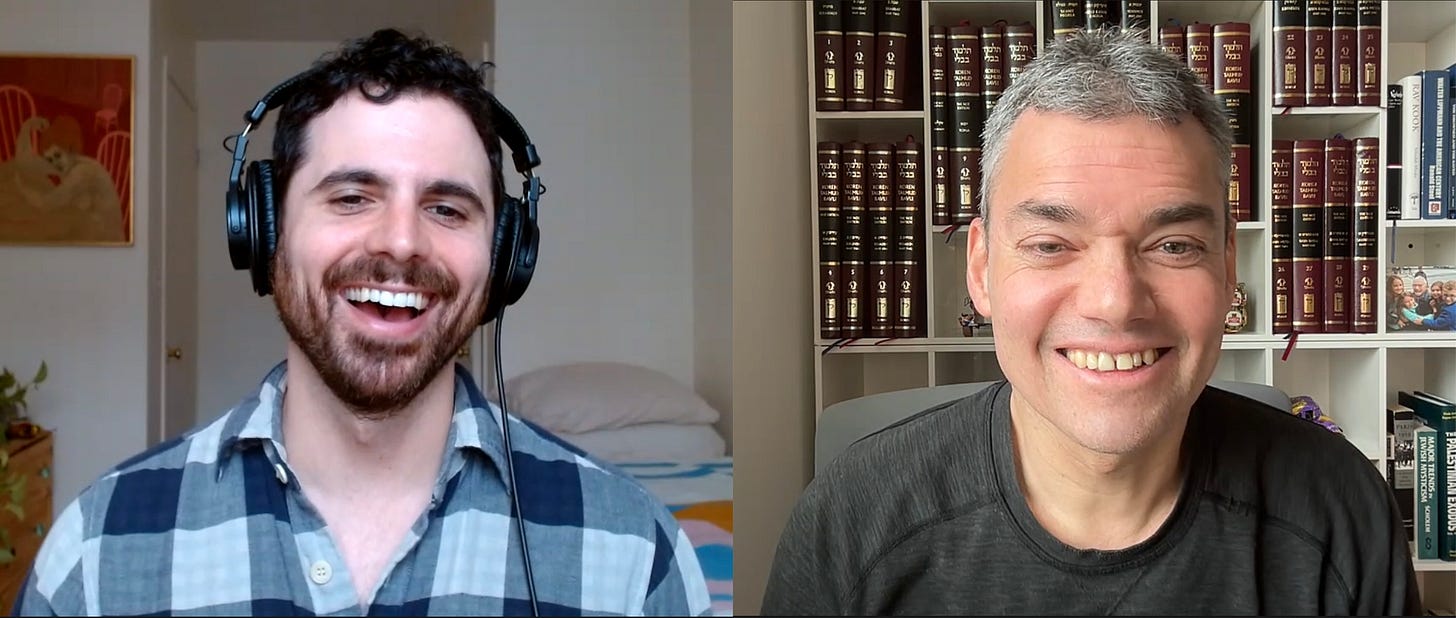Avoiding the “American Solution” in the Middle East—At All Costs
With Peter Beinart
My guest today is Peter Beinart, author of Being Jewish After the Destruction of Gaza. It’s hard to improve on his book title for summing up our conversation. We explored some of the history of American Jewish identity, the possibility that what we dubbed the “American solution” might succeed, and how, in Peter’s estimation, political equality is the surest path to collective safety and liberation.
Peter is a contributing opinion writer to The New York Times, the Editor-at-Large of Jewish Currents, an MSNBC Contributor, and a journalism and political science professor at CUNY. He also writes The Beinart Notebook on Substack.
I found it especially hard to trim down this week’s transcript, and I figured y’all might be interested in reading more than usual. The first 1,500 words or so, the typical length of our posts, are free for all readers. The last third and change of the transcript is for paying subscribers. Everyone can listen to the full interview on the Skipped History podcast, which includes a discussion of evolving understandings of antisemitism and more:
Avoiding the “American Solution” in the Middle East—At All Costs
Liste now (38 mins) | Podcast version of my conversation with Peter
Ben: To start, can you elaborate on what you see as the editing of Jewish holidays?
PB: Yes. Think about the prominent Jewish holidays in the collective American Jewish imagination. In the story of Hanukkah, Jews are oppressed, the Maccabees rise up, they rededicate the temple, and then Jews celebrate this overcoming of potential oppression. Or on Passover, Jews were slaves, God redeems us, we're free, and we celebrate.
None of this is inaccurate, but it's incomplete. These stories also have other elements. For example, the Book of Esther, read during Purim, doesn’t end with the Jews surviving attempted annihilation. It ends with an act of revenge by Mordecai, the Jewish leader. There’s a massacre of 75,000 people by Jewish forces.
This reality deviates from the traditional narrative that’s sometimes summed up in the joke: "They tried to kill us. We survived. Let’s eat." As I see it, the history is more: "They tried to kill us. We survived. And then we enacted another sort of atrocity against our enemies."
Ben: Or maybe it’s, "They tried to kill us. We survived. We tried to kill them. Before you think too hard about that, can you pass the salt, please?"
PB: Ha, yes, I think that’s right.
My point is that Jews are not just righteous victims whose responsibility is to survive, but, like other human beings, are sometimes in positions of power and face ethical dilemmas. Our sacred texts imagine we can act as victims and victimizers. But I think the idea that we are always victims has become a template for whatever interactions Jews have—in the case, for instance, of Israel and Palestine—keeping us from seeing and wrestling with difficult truths.
Ben: Why do you argue that saying Zionism isn’t a colonial movement is in itself a form of selective remembering?
PB: Anyone familiar with Jewish liturgy knows that Jews have an ancient and profound connection to this land. And yet, I think today when many pro-Israel Jews hear critics calling Zionism a colonial movement or a settler-colonial movement, they feel like that’s slander.
But colonialism was a term used quite frequently by early Zionist leaders themselves, partly because the term "colonialism" didn’t have the negative connotations back then that it has today. It was often used to describe bringing progress and modernity to what were considered more backward areas. But colonialism very often also meant dispossession, exploitation, and oppression.
Saying Zionism was a colonial movement doesn’t tell you everything you need to know about Zionism. Zionism was also a movement of national refuge and national liberation. You can imagine the experience of Jews surviving the Holocaust, being in displaced persons camps, and the profound gratitude and liberation they felt to be in a country where they felt safe and had political power.
That can be true, but it doesn’t mean it’s not also true that Zionism emerged in the high moment of European imperialism. The way Zionists talked about their experience in the Middle East wasn’t so different from the way Cecil Rhodes, the arch-imperialist of South Africa, was talking about his experience. Vladimir Jabotinsky, the founder of what's called Revisionist Zionism, the tradition that Benjamin Netanyahu comes from, had no problem comparing Zionists to Cortés and the Pilgrims because colonialism wasn’t a dirty word for him.
Ben: My red flags are arriving early to parties, not having any hot sauce in your refrigerator, and positively comparing yourself to the Pilgrims.
PB: Ha, what I’m saying is we can hold competing truths. We don’t have to forget the reasons many Jews were drawn to Zionism, but we also have to understand why, for Palestinians, this looked—and still looks—very colonial, given that Palestinians don’t have equality and are still being dispossessed.
Ben: You write that “the whole point of conflating anti-Zionism with antisemitism is to depict Palestinians and their supporters as bigots, thus turning a conversation about the oppression of Palestinians into a conversation about the oppression of Jews.” That gets us into something else I want to discuss: the argument that Israel had no choice in destroying Gaza.
PB: Right. The issue with this idea is it imagines that Israel's problem with the Palestinians and Hamas began on October 7th and is a problem that can be solved militarily—that you can destroy Hamas through endless military assault.
But first of all, that sort of approach hasn't succeeded. We're now in this ceasefire, and Hamas leaders are coming back out of the tunnels. Gaza has been destroyed—its hospitals, schools, buildings, agriculture—but Hamas is still there. You can kill a lot of Hamas fighters, but you're also producing more Hamas fighters—when you kill people's friends and family, they tend to want to fight you. And when you destroy their weapons, they can create and find new weapons. Israel has had Gaza under blockade since 2007, and during that period, Hamas's military arsenal has gotten stronger.
So Israel's fundamental problem in Gaza and with Palestinians is not a military problem, it’s a political one. The political problem is that millions of Palestinians are being held without basic rights. In the West Bank, they live under military law, without citizenship, the right to vote, or free movement. In Gaza, Palestinians are under blockade in what the UN called “unlivable conditions” before the war began. My friend Muhammad Shahada, whom I quote in the book, talks about how everyone he knew in Gaza thought about suicide, even though it's a grave sin in Islam because they had no future—no matter how much education they amassed, they had no prospect of getting a decent job, moving out of their parents' home, or even getting married because they couldn't afford it.
Under those conditions, if you inflict tremendous oppression and violence on people, you create the conditions for your own endangerment. If Palestinians don’t have political freedom—if nonviolent efforts at resistance are shut down—violent resistance becomes more likely. And that resistance will take the lives of Israeli civilians, something I profoundly don't want to happen.
Learn about the history of Hamas and much more from Rashid Khalidi, a Palestinian-American historian of the Middle East:
Ben: Talking about Israel's response to October 7th, you say an analogy would be America's response to attacks from Indian reservations in the 19th century.
It seems like there’s an argument to be made that Israel could defeat Hamas, or model a defeat of Hamas, on the defeat of an Indigenous group in the U.S. How would you respond to that?
PB: I think it's a really important question. I wouldn't say that Israel would defeat Hamas, but I think it's possible that Israel could defeat the Palestinian people—by destroying Palestinians.
As you hint, we could call this the American solution to the Palestinian problem. As the U.S. moved west in the 19th century, we did not create a two-state solution. Rather, not all Native Americans were killed, but so many were killed and destroyed that they could no longer function as a political resistance in the same way.
There are still Native Americans who resist in various ways, but they’re peripheral now to many white Americans' consciousness. In some ways, this is the macro-historical question: Can Israel in the 21st century do what the U.S. did in the 19th century and what many other settler-colonial states did in earlier moments in history? I think it’s very much an open question.
Progressives, because we tend to think history is a story of progress, want to believe that's not possible. One of the things Obama and John Kerry often said when they were in power was, "You can't do this kind of thing at this moment in history." And I think what the Benjamin Netanyahus and perhaps Donald Trumps of the world—who have a very different view of history—are saying is, "Just watch us." We’re in a world where international law isn’t becoming stronger but weaker, a world of rising authoritarianism, a world in which climate change is putting pressure on fragile norms.
So Israel could possibly successfully pursue a similar path. We would then be living in the moral wreckage of that horror. It would fundamentally change the way many of us think about Judaism and Jewish tradition itself.
We have to work as hard as we can to make sure that doesn’t happen. The consequences would be not only catastrophic for Palestinians but for Jews and the world. Suppose other governments see that Israel could succeed in using the American solution—there are many other so-called “surplus populations” that other regimes might want to do something similar to.
Ben: Broadening some of our global context here, you write of Jews, "We are not the only people to use a story of victimhood to justify supremacy." I wonder if you can elaborate on that point because I found your historical comparisons—Northern Ireland, South Africa, and Reconstruction in the U.S.—rather compelling.




